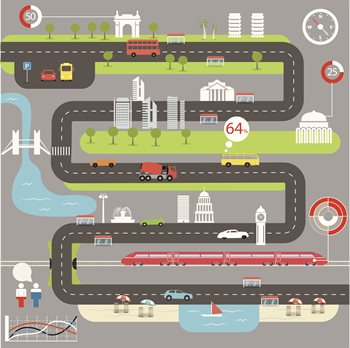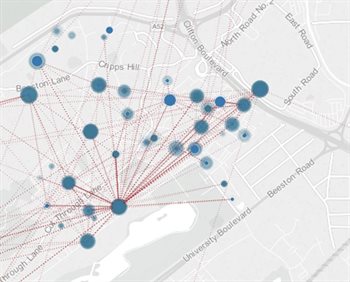Smart Campus – Smart Cities
‘Smart Campus-Smart Cities’ is an exciting, new and emerging research area within HFRG, although there are clear overlaps with other areas eg ‘road transport’ and ‘healthcare technologies’.
This research area focuses broadly on the development of sustainable, safe, responsive, resilient and inclusive environments - to study, work and live, underpinned and enhanced through the use of digital technologies and open data.
There are two contexts of interest, the university campus and the city, both with their own particular challenges, goals and associated stakeholders and yet also sharing a multitude of common issues, particularly relating to energy, transport/mobility and health and wellbeing/care.
Indeed, the campus in many ways serves as a small city with both residential and academic/office areas; its own transport and healthcare services; retail outlets; sports facilities; car-parking; security system; waste collection and energy generation networks. As such, the campus also serves as an ideal vehicle through which to observe, test and evaluate user behaviours, in addition to trialling smart city initiatives prior to scaling up. This research area focuses on both campus specific and city wide issues, exploiting both contexts and their inherent commonalities to advance and improve urban environments.
Projects
IMPETUS – Intelligent Mobility Project
Funder: Transport Systems Catapult and University of Nottingham, UK
Value: £359,185
Date: October 2014 - September 2017
Summary:
A collaborative project between the University of Nottingham and the University of Leicester, to support the Transport System Catapult’s work in the area of ‘Intelligent Mobility’, the smart, green, more efficient movement of people and goods.
IMPETUS is a 3 year project, launched in October 2014 and continues to deliver a programme of activities focusing on the key themes of ‘End to End Journeys’; ‘Autonomous Transport Systems’; Modelling and Visualisation’ and ‘Information Exploitation’. Activities include a variety of academic placements e.g. the analysis of Twitter data (sentiment analysis) during rail disruption and understanding air quality issues in urban areas using GIS, open source and emissions data, to PhD internships exploring ‘trust in autonomous’.
IMPETUS online brochure
IMPETUS at Nottingham


Intra and intercampus mobility
Funder: N-SERP-Nottingham Summer Engineering Research Programme
Value: £7,500
Date: June 2016 - August 2016
Summary:
3 undergraduate summer placements were funded by IMPETUS, to examine various aspects of intra and inter campus mobility from the perspective of staff, students and visitors. Projects ran from June to September 2016, (10 weeks) and culminated in a short report and a poster. E.g.
- Identifying Intercampus staff movement and travel modes
- Intercampus travel (Hopper bus) and student movement
- Smart Campus – identifying UoN Open Day visitor movement
Further projects are proposed this summer to develop and extend this work.
HFRG members:
- Nancy Hughes (Project Manager)
- David Golightly
- Jessica Wardlaw

PhD Students
- Julie Waldron “Variability of human behaviour in outdoor public spaces, associated with the thermal environment”